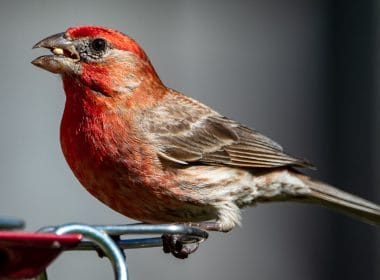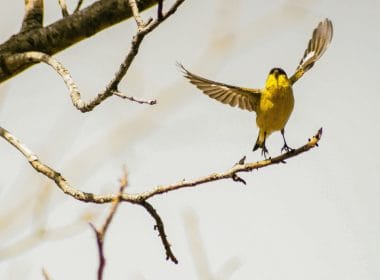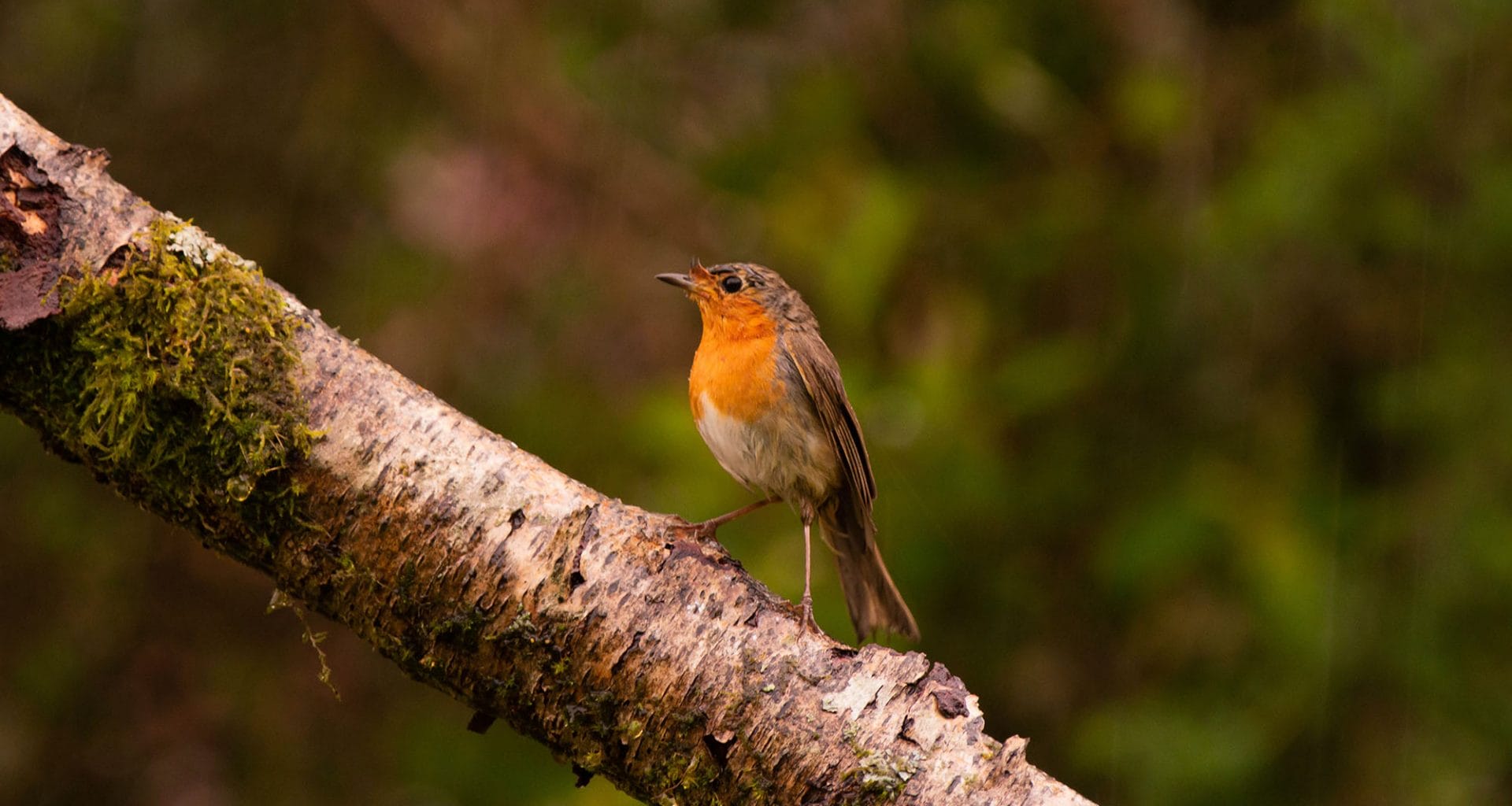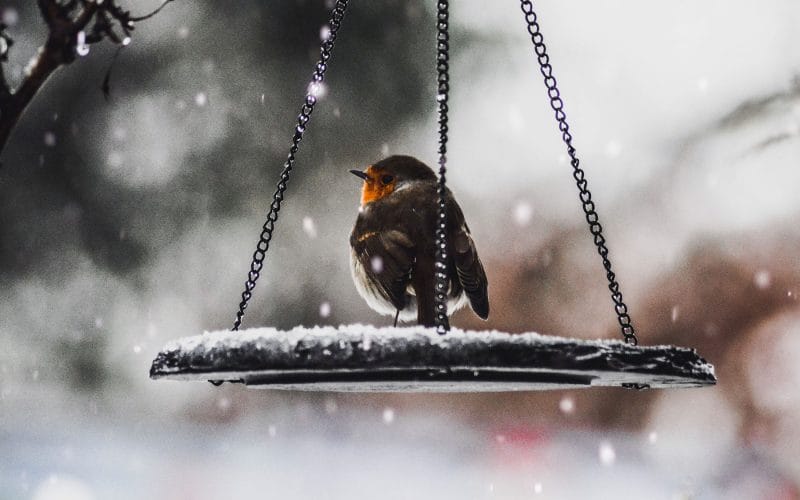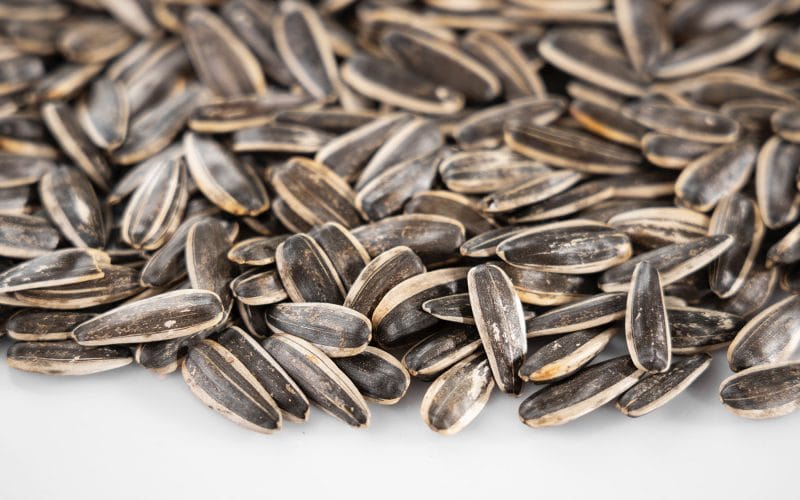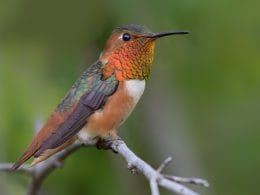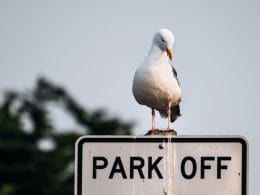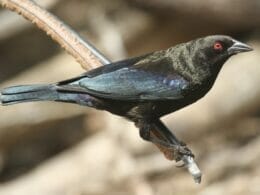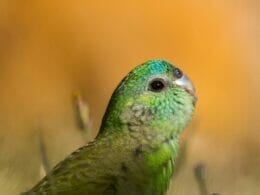Do you have robins wandering into your backyard scavenging for food? Or do you actually want them to? Birds in the garden can help keep it thriving. They’re also a pleasure to have with their sweet chirping and fluttering around. But how can you attract them? And what to feed them? Do robins eat bread?
The short answer is no. Robins prefer many other foods over bread as it adds no beneficial value to them. In fact, it has many risks. That being said, if you tear a piece of bread up into pieces you may be able to entice a robin to eat them.
Want to learn more about what robins eat? Keep reading to find out!
Why You Shouldn’t Feed Robins Bread?
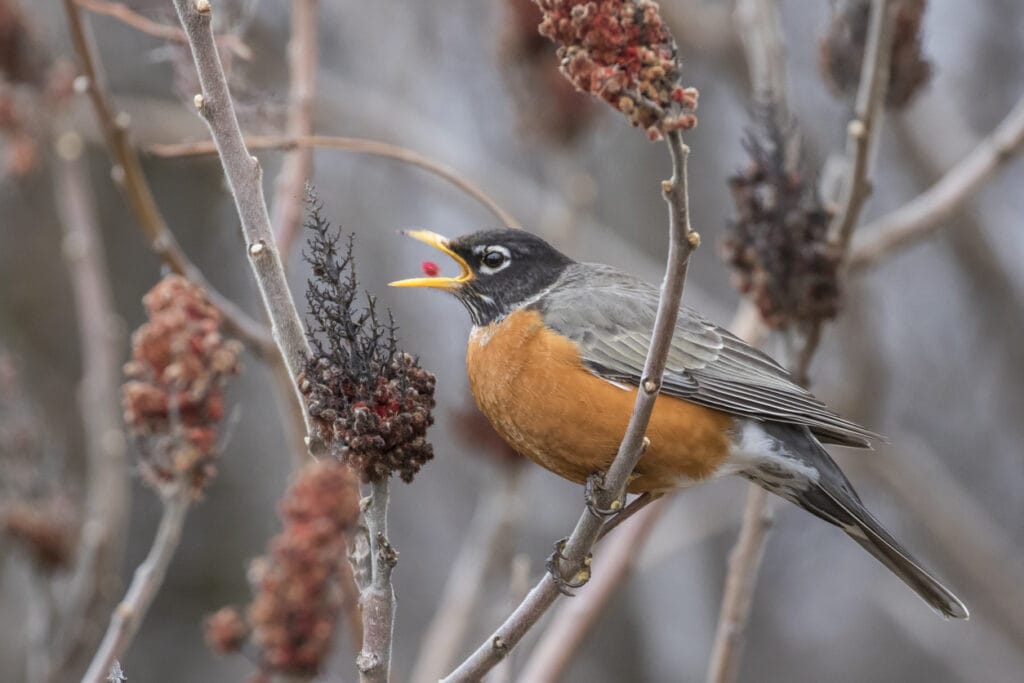
Since robins are really small birds, their bodies don’t store energy. Instead, they’re constantly feeding to survive. Their diet needs to be complete and balanced with the same nutrition requirements we live on. This is the main reason why robins don’t eat bread.
While bread is high in carbs, and makes birds feel full, it’s low in nutrition value. Their bodies don’t get the necessary fats and proteins they crave. This leaves them low in energy and unable to grow properly. In other words, birds could literally be starving while constantly feeding.
Author Note: However, if you only introduce bread occasionally and in low quantities that might not cause an issue. It’s best if you cut it into tiny pieces and give it wet for easier ingestion. Little birds, in particular, could choke on it otherwise.
Also, in this case, you’ll have to pay extra attention to bread mold. Moist bread will rot in no time, and its consequence could be hazardous for birds. It could cause respiratory infections which are fatal to your fiery-chested bird.
Not to mention, mold can be a breeding ground for salmonella, which is even worse! Now you know why robins don’t eat bread.
What Other Dangers Could Bread Cause to Birds?
Although it’s less common in garden birds than waterfowl, angel wing is just another sad outcome of feeding on bread. This deformity is called as such because a bird’s wings start to droop, and with time they flip outwardly resembling spread angel wings.
This deformity occurs in immature birds due to fast growth, and it prevents them from flying. Although scientific research in this department hasn’t been conclusive yet, high energy diets have been found to play a major role.
So, the next time you decide to feed any birds, make sure to stay away from bread.
What Other Foods Should You Avoid Giving to Your Robin?
In order to attract a robin to your home, you should figure out which foods they enjoy, and which ones not so much. Don’t worry, we’ll put you on the right track!
Striped Sunflowers Seeds
Although they’re a famous treat for birds, they actually have thick shells that can be hard to crack. You can either open them and give the robins the heart, or you can opt for black sunflower seeds which have a thinner shell to break.
Chocolates
If you have any pets, you probably already know that. Chocolates are basically toxic for anyone besides humans. For birds, they cause increased heart rate and vomiting, if not life-threatening.
Fruit Skin
Most fruit skins are covered in pesticides, even organic ones are exposed to them. Although our bodies can handle a little amount of residual pesticides on fruits, birds’ can’t. Pesticides are poisonous to robins.
Seed and Pits of Fruits
Many fruit seeds and pits contain a cyanide compound which is quite dangerous to your robin. We’ve got you the complete list, so you can know what to avoid:
- apples
- Pears
- Cherries
- Apricots
- Avocados
- Peaches
- Nectarines
- Plums
Big Birds-Food
Dried lentils, rice, and wheat are all very difficult to eat for small birds like robins. Beans and peas are considered big birds-food too. However, make sure you offer them cooked as raw ones can be poisonous.
Birdseed is also considered too tough to crack and digest by small birds like robins.
Foods That Will Have Robins Crowding Your Backyard
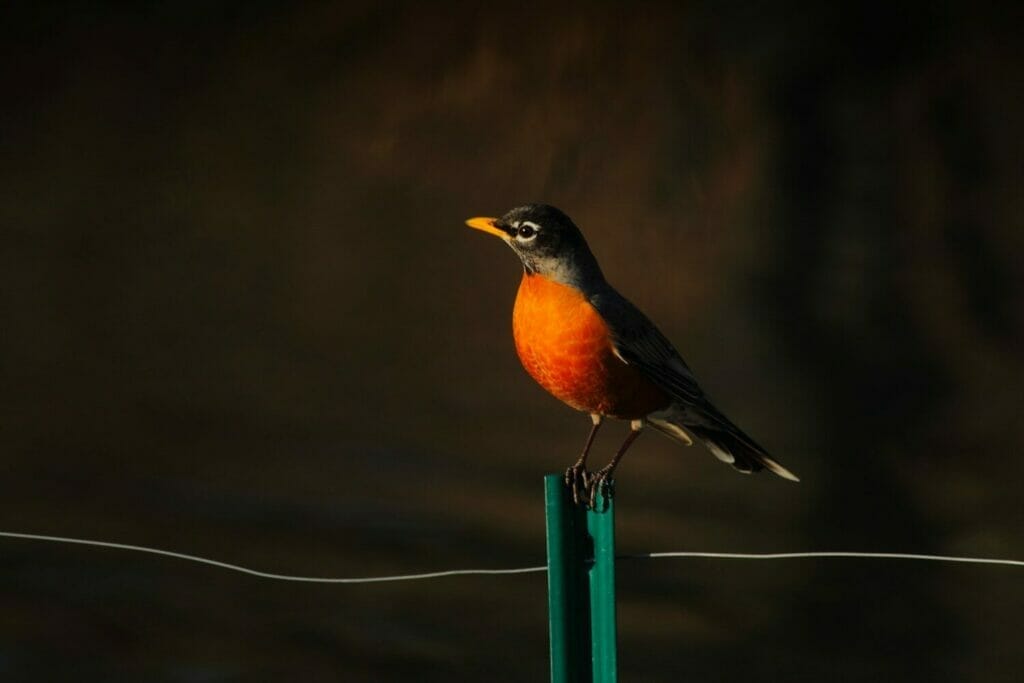
Robins’ diet consists largely of worms; earthworms, and insect larvae are the most common ones. They also love insects, it doesn’t matter if they’re caterpillars, bugs, or beetles they’ll dig right in! These are all great options instead of trying to get robins to eat bread.
Author Note: Robins not only keep your crops safe from pests, but they help pollinate them. So, you can repay them by helping them nest in your garden and by providing food. Here are some of the foods that robins enjoy.
Fruits
You can offer fresh or frozen fruits. Here’s a small list of fruits that will all do perfectly.
- Apples,
- Raisins,
- Berries
- Grapes
- Pears
Suet
Suet is a favorite among birds. It’s made of animal fat so it’s nutritious and easily digested. On the other hand, polyunsaturated fats aren’t as healthy as they don’t give the birds the energy levels they need.
Mealworms
Mealworms might not seem like the best idea for you, but robins love them! You can buy them in dried, packaged form so they’re easy to store. You just sprinkle some water on them before offering them to the robins.
Or, you can get the live ones. It’s totally up to you.
Kibbled Peanuts
Kibbled peanuts are a great offering to attract robins. They’re nourishing, tasty, and their small size will make it easy to eat without fear of attack or choking. Make sure they’re unsalted as robins can’t handle salt.
Tips to Help Robins Find Worms
Since worms are a major part of robin’s diet, it’s only fair we do what we can to help them catch some.
Make sure your lawn is wet, that will draw worms to the surface. Also, a well trimmed soil will give the robins a better line of vision.
Another thing you can do is pile leaves, the damp soil underneath will make for the perfect conditions for worms. Robins with their penetrating sight will easily pick through the leaves to reach the worms.
How and When to Feed Robins?
Most of the year, robins will be able to fend for themselves. Nonetheless, winter can be a cruel time. Insects and worms are either dormant or hard to find, and sunflower seeds are blown away. Everything is wet and covered in snow, so there is scarcely any edible food.
This is the time they need the feeders the most. So where to put them and how to attract robins?
You’ll need to place the feeders near a cover, a tree, or a bush, so robins can easily hide from predators.
A covered ground bird feeder is the perfect way to go. It guarantees safety, and it gives them room to dig for worms and insects as they please. If you already have a hanging feeder, then just add a platform, so they can perch on it while eating.
When Robins start coming in numbers, you might want to set up a couple of feeders to avoid overcrowding. Small ones are better because they get emptied regularly, so the food doesn’t get the chance to spoil.
Author Note: If you want to attract robins, in addition to the food and the safe bird feeders, you can add a nestbox. It should be hidden and surrounded by chicken wire to prevent cats from jumping in.
Lastly, don’t forget to place a water container as well.
Can You Keep Robins as Pets?

If caged, robins won’t take a large space, they’re friendly unlike a lot of other birds, and they’re easy to take care of. So, we understand the temptation. But here are the reasons why you can’t keep robins as pets.
Robins need to stay with their parents for at least a year and a half. The first part of their life is considered very critical, so they are either mentored through it, or they don’t survive.
They survive it by learning to fly and to hunt. Staying in a cage will take that away from them. If you choose to get a grown robin, you should remember that birds aren’t domesticated animals. They have a hard time with cages; they might even show it by pulling their own feathers with their bills, and refusing to eat.
Aside from the moral choice you have to make, caging robins is illegal in many countries around the world so make sure you’re not breaking the law.
Wrap Up
Although bread itself isn’t poisonous, it should only be consumed in small quantities and very cautiously. It needs to be wet, and you need to ensure that it’s not spoilt. Even then, it won’t be a healthy food choice for your robin.
If taken in large quantities, it could result in undesirable complications including respiratory infections and angel wing.
It’s not the only food you should steer clear of – birdseed, chocolates, milk, and fruit pits are all harmful to robins. Make sure you put selective foods in your feeders, those can vary from mealworms to fruits, peanuts, and cheese.
If the feeder is too much of a hassle, you can still help robins find food by making your garden more inviting to worms. Trust me, the robins will follow suit! We hope you enjoyed this article on whether or not robins eat bread.
Fly high friends!
FAQ
Simply put, they eat whatever their parents give them. Most songbirds increase the amount of insects and worms that they eat when they are nesting. This is so that the babies get a high level of protein which helps them grow.
Robins really like worms. That’s why you see them so often on lawns in the morning. The grass is damp and the worms come to the surface. Makes and easy meal for the robins.
If you put bananas on a bird feeder then robins may well take them. However, bananas are a tropical fruit and they don’t grow in the robin’s normal range. You should only really put foods that the bird normally eats on a feeder.
